-
Reasons to Improve Your Company’s Waste Management System
From recycling programs to waste audits, there are many strategies for cutting down on what your company tosses into its dumpsters in Atlanta, and there are several good reasons for you to improve your company’s waste management system .
The most obvious reason to make smart changes in the way your business manages and disposes of waste is that doing so can save you money. Additionally, by conducting a waste audit to learn what is filling your dumpsters, you can discover what types of waste and how much of each your company is producing, allowing you to make strategic changes. Also, better waste management practices mean that your company’s operations can have less of a detrimental impact on the environment, for example, by using fewer resources and producing fewer greenhouse gas emissions. Finally, making your business more environmentally friendly in this way allows you to create a greener image for your business that both your staff and customers can appreciate.

-
A Brief Guide to Greenhouse Gases
Did you know that recycling everything from food to electronics can help reduce greenhouse gas emissions? While recycling technology and waste disposal practices continue to improve, many people aren’t aware of the ways that waste management can affect the environment. If you’re interested in embracing better waste management in Atlanta and want to know more about its effect on the environment, then keep reading for a quick overview of greenhouse gases.
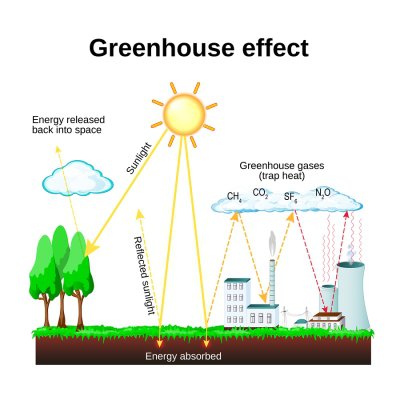
What Greenhouse Gases Are
Any gas that causes heat to be trapped in the earth’s atmosphere is referred to as a greenhouse gas. Some of the most prevalent greenhouse gases include carbon dioxide, nitrous oxide, and fluorinated gases. The greater the rate of emissions for a particular greenhouse gas, the higher its concentration will be in the atmosphere. Different gases remain in the atmosphere for different lengths of time, and the warming effects of various gases can differ.
Where Greenhouse Gases Come From
According to the U.S. Environmental Protection Agency , some of the economic activities that most contribute to the production of greenhouse gases are transportation, electricity production, industry, and agriculture. Also, most of these greenhouse gas emissions are in the form of carbon dioxide, followed by lesser amounts of methane, nitrous oxide, and fluorinated gases.
Why Greenhouse Gases Matter
Climate change is a natural phenomenon, but the greenhouse gases produced by human activity may drive global warming in an unnatural way. Through activities like raising livestock, driving cars, using energy, and managing waste poorly, human activity can produce greenhouse gases that may promote global warming.
What You Can Do
While climate change is a global issue, there is plenty that you can do in your day-to-day life to help minimize your contribution to greenhouse gas emissions. Some examples include recycling, reducing and reusing, choosing energy-efficient home appliances, switching to LED light bulbs, carpooling, and buying products that have less packaging. Other ways to do your part include driving an electric hybrid vehicle, telecommuting to work, and turning the thermostat up or down by a few degrees when you go to sleep or leave the house for the day.
-
FAQs About Industrial Waste Management
Implementing an effective system for industrial waste management in Atlanta is important for ensuring that your company practices responsible, efficient, and environmentally-friendly waste disposal. To learn more, read on to discover the answers to common questions about industrial waste management.
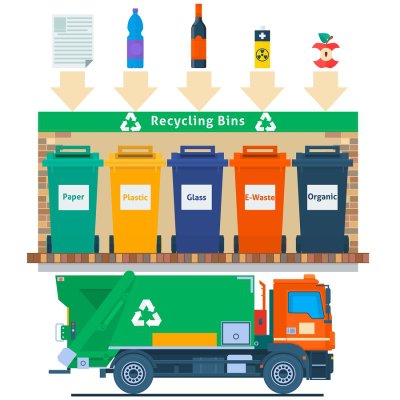
What is industrial waste?
Industrial waste refers to non-hazardous waste materials that are generated through industrial activity. Some examples of activities that produce industrial waste include construction, textile manufacturing, and automotive maintenance.
Why does industrial waste management matter?
Proper industrial waste management is important for protecting the environment and human health. Also, improving your waste management practices through recycling, zero waste initiatives, and other measures may reduce your regulatory and business expenses.
What types of sites require industrial waste management services?
Some examples of locations that typically need industrial waste management include distribution, food processing, automotive, and manufacturing facilities, as well as warehouses and appliance manufacturers.
How can I reduce my facility’s need for industrial waste management?
There are several steps that you can take to cut down on your facility’s waste management needs. For example, you can upgrade to newer technology that produces less waste, ensure proper training for your employees, maintain your facility and equipment, and implement a recycling program. Also, you can work with your waste management service to track your facility’s waste generation and identify possible areas for improvement.
What is a zero waste initiative?
A zero waste initiative is a detailed sustainability plan that industrial facilities can implement. These initiatives offer companies a number of potential benefits, such as lower material and manufacturing costs, less waste production, and reduced waste management costs. More notably, beginning a zero waste initiative can give your company a greener image, as these plans are designed to help facilities operate in a way that is environmentally responsible and sustainable. If you’re interested in beginning a zero waste initiative, then contact your waste management partner to learn about their sustainability services.
-
Could Waste Be the Newest Source of Energy?
If you’re like many people who are concerned about cutting back on waste near Atlanta , then you may be interested in learning what one city is doing to make the most of the trash it generates. Watch this video to get an introduction to something called waste-to-energy.
The local government in Alexandria, Virginia partnered with an energy corporation to power more than 20,000 homes with a process called waste-to-energy. Despite recycling efforts, there is still a lot of waste that ends up in dumpsters. This process allows the area to burn their garbage for energy, rather than dump it in a landfill. Through innovation, they have stayed ahead of EPA regulations over the years, for example with new filtration technology for their furnaces, making this waste management process a promising one.
-
FAQs About Food Recycling
For many companies, a significant amount of the food they purchase ends up in dumpsters. If you’re looking for a better alternative to throwing away your business’ food waste near Atlanta , then you may benefit from learning about a process called food recycling. Read on to learn the answers to frequently asked questions about this waste management option.

What is food recycling?
Tons of food that can be recycled are sent to landfills every year, and this is a trend that is both wasteful and expensive. Food recycling is much like it sounds and involves the recycling of food waste. If your business produces a lot of food waste, then you, your consumers, and the environment may all benefit if you were to adopt a food recycling system.
What are the benefits of food recycling?
There are many good reasons to get on board with food recycling. First, this process can reduce waste management costs and support zero waste initiatives. Also, food recycling benefits both consumers and companies by improving purchasing discipline and inventory control, because less product wasted means less spending for businesses and lower prices for customers. Additionally, cutting down on food waste benefits the environment by keeping more methane-producing garbage out of landfills and reducing the amount of food that needs to be produced.
Who should use food recycling?
While there is a lot of potential for food recycling, the food service industry is most impacted. Companies that produce or purchase food can direct food waste into the recycling stream instead of the dumpster. From there, the waste can be used to produce animal feed and compost. Also, industrial facilities can use food waste to generate electricity, using the natural gas produced by a process called anaerobic digestion.
What happens after food is recycled?
Companies in the food industry can later benefit from sending their food waste into the recycling stream. For example, the resulting animal feed and compost can be used to produce animal products and crops, and the electrical power generated from anaerobic digestion can provide electrical power for food processing facilities.
-
Understanding the Categories of Hazardous Waste Generators
Hazardous waste is a byproduct of many industrial processes. If your business creates hazardous waste during its daily operations, you will need to create a waste management plan that complies with federal and state regulations. A company that offers dumpster rental near Atlanta can help you manage your hazardous waste and set up regulated waste disposal services for all of your byproducts. To assist you as you create your waste management plan, here is a closer look at the three categories of hazardous waste generators.
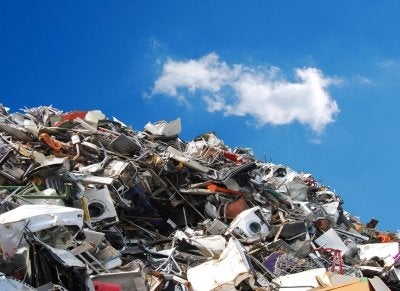
Conditional Exempt Small Quantity Generators
Conditional Exempt Small Quantity Generators are typically referred to as CESQGs. In order to fall into the CESQG category, a person or business must create no more than 100 kilograms of hazardous waste each month. If you or your business has recently been classified as a CESQG, you will need to make sure that you keep track of all of your daily waste products. It is also necessary to send your hazardous waste to a facility or waste management station that specializes in processing hazardous goods.
Small Quantity Generators
Small Quantity Generators create more than 100 kilograms of hazardous waste each month, but their hazardous waste totals must not reach more than 1,000 kilograms in a month’s time. For the first 180 days of their operations, Small Quantity Generators are allowed to operate without receiving federal hazardous waste permits. Each Small Quantity Generator must process their waste in an approved container or tank, and there also needs to be an emergency response coordinator on site to deal with unexpected leaks or spills.
Large Quantity Generators
Large Quantity Generators are typically major industrial facilities that create upwards of 1,000 kilograms or more of hazardous waste every month. Each Large Quantity Generator must have its own, on-site containers or approved waste disposal bins. According to EPA regulations, Large Quantity Generators must also meet all standards that are set out in the hazardous waste manifest. A Large Quantity Generator must also provide written reports to the EPA twice during each calendar year.
-
Spotlight on Types of Landfills
When you toss your garbage in the nearest dumpster, you may not give a second thought as to where it heads after it has been collected by a trash pickup service. In fact, there are several different kinds of landfills that serve various waste management functions. After you set up dumpster rental near Atlanta, you may want to ask your waste management professionals about the different types of landfills that are used to process your waste. To help you understand common waste management practices, here is an overview of three of the most common types of landfills.
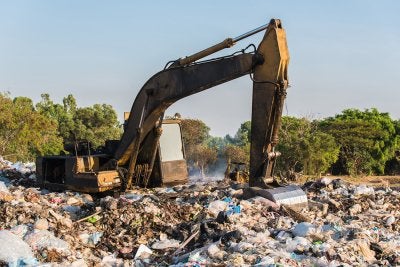
Municipal Solid Waste Landfills
Household trash and rubbish is typically sent to a Municipal Solid Waste Landfill, or MSWL. MSWLs are located across the United States, and each city, town, or county typically has its own landfill site. These landfills must be located at a safe distance away from neighborhoods and commercial districts, and they must also be equipped with liners and leech collection systems that prevent the surrounding groundwater from becoming contaminated.
Industrial Waste Landfills
An industrial waste landfill is specifically designated for the disposal of solid industrial waste products. Industrial waste landfills are engineered to safely house a variety of different types of industrial waste products, including plastic, glass, concrete, and construction debris. Along with collecting industrial waste, these landfills also serve as disposal sites for construction debris. It is important to note that hazardous waste products, such as asbestos, cannot be processed at a standard industrial waste landfill facility.
Hazardous Waste Landfills
A third type of landfill is known as a hazardous waste landfill. Since these landfills are designed to house many different types of hazardous waste, they are subject to strict regulations from the EPA. Every hazardous waste landfill must contain a double liner, runoff control system, and leak detection technology. Hazardous waste landfills are routinely inspected to make sure that they are not leaking harmful materials into the surrounding environment. If your business generates hazardous waste, you will need to make sure that your waste materials are being delivered to one of these landfills.
-
The Basics of Recycling
Are you thinking about beginning a company-wide program for recycling in Atlanta? If so, then you are on your way toward reducing waste and promoting a greener workplace . During this type of transition, it’s common for people to wonder about how materials are recycled. Watch this video to learn the basics of recycling.
The recycling process involves collecting waste products and then breaking them down into materials that can be used to create new products. Each type of recyclable product is broken down in its own way, and most recycling plants use either a single stream or dual stream system. Dual stream involves the division of paper and anything else in the recycling bin, while single stream requires sorting a mixture of recyclable products.
-
Up Close with the Waste Management Needs of a Grocery Store
Grocery stores are responsible for the contents of most Americans’ pantries. They’re the all-important conduit between farmers and consumers. Part of running a successful grocery store is making sure all waste needs are taken care of; after all, no one wants to shop at a grocery store with an overflowing dumpster nearby. Here’s a look at the average grocery store’s waste management needs and how those needs can be satisfied by waste disposal experts in Atlanta .
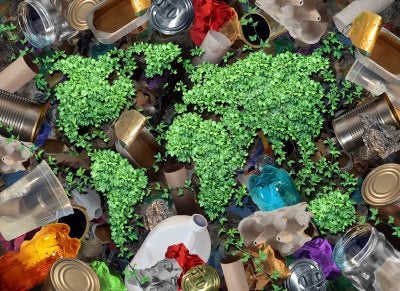
Packaging
Grocery stores have thousands, if not millions, of units of product delivered every year. Whether these products are from down the street or across the ocean, they need to be properly packaged to prevent damage or contamination. Once these products arrive, it’s the grocery store’s responsibility to remove and discard the packaging in a responsible manner. Fortunately, most product packaging these days is recyclable, making it relatively easy to dispose of in an environmentally friendly way.
Food Waste
In an ideal world, the average grocery store would sell all of its perishable food products before they rot or expire. In the real world, however, grocery stores need to find a way to dispose of any fruits, vegetables, meats, and dairy products that don’t sell quickly enough. Some grocery stores partner with local food banks, which then deliver the food to people in need. Whatever’s left is picked up by a waste management company and delivered to a place where it can be composted.
Renovations
Whether it’s decorating for a new season, altering the layout, or renovating, grocery stores frequently undergo changes to stay competitive. When it comes to this kind of change, the average grocery store is inevitably going to produce some waste. Renting a roll-off dumpster for the duration of these change can help simplify waste management. Once the project is over, a waste management firm can pick up the dumpster and properly dispose of the waste therein.
-
Waste Management in a Senior Living Community
Like any other residential community, senior living communities must take measures to ensure that their waste management needs are met. That said, senior communities have unique considerations that can only be addressed by a select few waste management companies in Atlanta. If you are in charge of handling waste disposal for a senior living community, think about the following factors when settling on a waste management company.

Garbage and Recycling
Dealing with day-to-day garbage is the most obvious waste management consideration for any community. Working with garbage specialists to estimate your community’s average garbage output is an important first step in determining how much dumpster space you need. Don’t forget the importance of recycling—there’s a good change that your staff and residents are throwing away items that can be recycled. Having a waste management company help with recycling can keep recyclable and compostable materials out of landfills.
Biological Waste
Senior living communities tend to have different medical needs than other communities. Some senior communities have a nursing staff to make sure seniors receive the healthcare they need to stay happy and healthy. Administering healthcare in such an environment often produces biological waste that can’t be disposed of in a normal manner. As the manager of a senior living community, you’ll need to find a company that’s qualified and equipped to handle certain types of biological waste.
Medication Disposal
Senior living communities are often targeted by criminals looking for prescription drugs. Not only can this put the members of your senior living community at risk, but it’s harmful to the surrounding community as well. It’s definitely a good idea to work with a waste management company in Atlanta to ensure that your dumpsters are properly secured, or else settle on an alternative method of disposing of medications. Enacting secure waste management practices can keep would-be criminals out of your community and your residents safe.
RECENT POSTS
categories
- Uncategorized
- Waste Management Atlanta
- Waste Disposal and Recycling
- Hazardous Waste Disposal
- Chemical waste removal
- solid waste removal
- R3 Program
- Sustainable Organizations
- Sustainable Waste Removal
- Commercial Waste Removal
- Materials Management Program
- Dumpster Rental
- Roll Off Dumpsters
- Construction Site Waste Removal
- Sustainability
- Recycling in Atlanta
- Industrial Recycling
- Industrial Waste Removal Services
- Southern Waste & Recycling
- Waste Removal Atlanta
- Waste Specialists
- Atlanta
- Infographic
- Front Load Dumpsters
- Rear Load Dumpsters
- Reusable Electronics
- Dump Truck Atlanta
- Recyclable Electronics
- Trash Compactors
- Recycling
- Recycling Program
- Office Recycling
- Metal Recycle
- Electronic Waste
